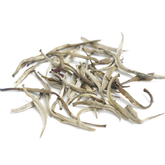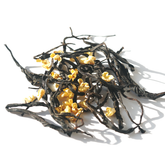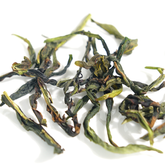Tea and Caffeine:What Tea Has the Most Caffeine?|NPTEA
According to a 2023 survey by the American Tea Association, 71% of consumers believe white tea has no caffeine, but laboratory data reveal the harsh reality: some white teas contain more caffeine than black coffee! Even more shocking, the UK’s Food Standards Agency once warned that a Chinese black tea product had a caffeine concentration 300% above the limit (Source: FSA/2022-ALERT-0773). With tea caffeine content varying widely across different teas, many people are left wondering: what tea has the most caffeine?
As a Chinese tea master who has worked with a wide variety of teas, I’m here to uncover some truths. In fact, each tea’s caffeine in tea differs, and understanding these differences helps you choose the right tea based on your needs. In this article, we’ll take an in-depth look at which tea has the most caffeine, and explain why tea type and brewing methodscan have such a big impact on caffeine levels.
Why Does Tea Have Caffeine?
Tea contains caffeine because caffeine is a naturally occurring compound in the tea leaves of Camellia sinensis. This caffeine in tea acts as a natural insect repellent, helping protect the plant from pests and supporting its growth. For the tea plant, tea caffeine content isn’t just about giving us an energy boost—it’s one of its self-defense mechanisms.
All types of tea contain caffeine
All tea comes from the same plant—Camellia sinensis—so they naturally contain caffeine. Whether it’s green tea, black tea, white tea, or oolong tea, they all start from the tea plant’s leaves; only the processing methods differ, which is why their tea caffeine content and caffeine in tea vary.
But it’s important to note that herbal tea is different. Herbal teas don’t come from the tea plant; they’re made from other botanicals like flowers and roots, so they’re typically caffeine-free. For example, mint tea and chamomile tea are made from mint leaves and chamomile flowers—plants unrelated to Camellia sinensis. Likewise, Rooibos tea, despite its name, comes from a legume shrub in South Africa and is naturally free of caffeine.
What tea has the most caffeine?
In discussing what tea has the most caffeine, it’s important to understand that tea caffeine content is not determined solely by tea type, but is influenced by tea leaf form, processing methods, brewing time, and water temperature. We can’t simply say green tea has the highest caffeine or black tea. When we drink tea, our caffeine intake mainly depends on the following factors:
-
Tea leaf form: The shape and size of the leaves directly affect caffeine release. Broken tea leaves (like those in tea bags) have a larger surface area, so caffeine in tea is extracted more quickly. Whole loose leaves release caffeine more slowly, resulting in lower caffeine levels. For example, Japanese matcha, which is finely ground, can have very high caffeine.

-
Processing methods: Different tea processing methods impact caffeine levels. Fully oxidized teas like black tea and many oolong teas tend to have higher caffeine because their leaves are more broken down during processing, releasing more caffeine. In contrast, lightly processed teas like green tea and white tea release less caffeine.
-
Brewing time: The longer the steeping time, the more caffeine is extracted. Extended brew times allow more caffeine to dissolve into the cup, especially with finely broken leaves.
-
Water temperature: Hotter water extracts caffeine more effectively. Brewing with near-boiling water releases more caffeine, whereas using cooler water or cold brew methods greatly reduces caffeine extraction and bitterness.
-
Tea cultivar: Different tea cultivars naturally contain varying caffeine levels. Teas grown at higher elevations, such as those from Yunnan, China, often have more caffeine, and certain tea plant varieties are inherently higher in caffeine.
How to Reduce Caffeine Intake from Tea
To reduce caffeine intake from tea, the most effective methods are: 1. Use water below 80 °C for brewing, as high heat extracts more caffeine. For example, green tea brewed with boiling water for 5 minutes contains about 40 mg of caffeine in tea, but switching to 70 °C water and a 2‑minute steeping time lowers it to 15 mg; 2. Rinse the leaves: steep in hot water for 5 seconds and discard the first infusion—USDA research shows this removes 30–40% of the caffeine; 3. Choose older, autumn‑ or winter‑harvested leaves, such as Shoumei white tea (15 mg/cup), which has one‑third the caffeine of spring‑harvested Silver Needle (45 mg); 4. Try cold brew: steep in cold water for at least 6 hours—cold brewing can reduce caffeine by 40% compared to hot brewing.
By applying these tea brewing methods, you can effectively control your tea caffeine content while still enjoying the aroma and taste of your tea.
Conclusion
What Tea Has the Most Caffeine? isn’t determined solely by the tea type. In reality, your caffeine intake from tea depends on multiple factors: tea leaf form, processing methods, steeping time, and water temperature all directly affect the amount of caffeine released, with cultivar being only one piece of the puzzle. Broken tea leaves, like those in tea bags, release more caffeine in tea due to their larger surface area. Fully oxidized black tea and many oolong teascontain higher caffeine content, while lightly processed green tea and white tea contain less. The longer you steep and the hotter your water, the more caffeine you’ll extract.
If you want to reduce caffeine in tea, adjust your tea brewing methods: shorten your steeping time, use lower water temperatures, or select specific tea varieties with naturally lower tea caffeine content.
SEE MORE ABOUT TEAS
If you have questions about selecting tea:
Learn-more-about-chinese-tea
If you have questions about the benefits of tea:
Health-benefits-of-chinese-tea
If you have questions about brewing tea:
How-to-brew-loose-leaf-tea






